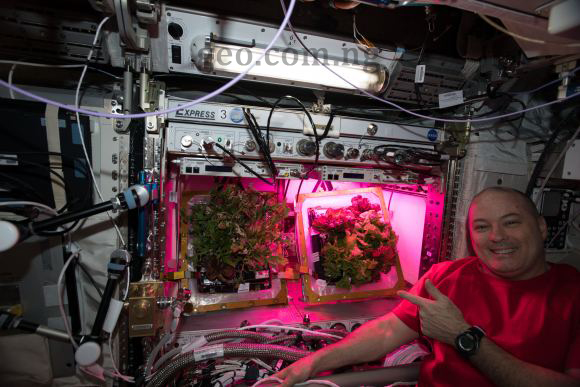NASA Working to Address Nutrient Loss in Astronaut Food for Long Missions
Key Takeaway
NASA is developing genetically engineered microbes that can produce essential nutrients and compounds for astronauts on long-duration space missions, addressing the issue of nutrient loss in prepackaged foods over time.
Summary
- Prepackaged foods used by NASA lose nutritional value over time, posing a challenge for long-duration space missions where resupplying from Earth is impractical.
- NASA’s Ames Research Center’s Space Biosciences Division has launched the BioNutrients project to enable future space travelers to grow their own supplements.
- The approach involves storing dried microbes and food-grade bioreactors, which can rehydrate and culture the microbes to produce essential nutrients and compounds years after departure.
- The team has successfully produced carotenoids (antioxidants), follistatin (for muscle loss prevention), and yogurt and kefir (for gut health) using genetically engineered microbes.
- The real challenge lies in making the produced food palatable and appealing for astronauts to consume.
- Bioreactors are containers that maintain a biologically active environment suitable for growing cells, tissues, or organisms through aerobic or anaerobic processes.
- Growing food during long-duration missions addresses logistical challenges and launch overhead associated with carrying prepackaged food for extended periods.

Complete Story
As humanity ventures deeper into the cosmos, the challenge of sustaining astronauts on long-duration space missions becomes increasingly complicated. One of the fundamental concerns is ensuring adequate nutrient intake for their well being and performance. Recognizing the limitations of prepackaged foods, which lose nutritional value over time, NASA’s Ames Research Center’s Space Biosciences Division has embarked on an innovative project called BioNutrients, aimed at enabling future space travelers to grow their own supplements.
Conventional prepackaged foods, while convenient for short-term missions, pose a significant challenge for extended space travel. Over time, these foods experience a gradual decline in nutrient content, potentially leading to deficiencies that could jeopardize astronauts’ health and mission success. Moreover, carrying vast quantities of prepackaged food for years-long journeys is impractical, adding excessive weight and logistical burdens to already complex missions.
To overcome these hurdles, NASA’s BioNutrients project has devised an ingenious solution – genetically engineered microbes that can produce essential nutrients and compounds on demand, with minimal resource consumption.
The BioNutrients Approach
The BioNutrients approach involves storing dried, genetically modified microbes and food-grade bioreactors aboard spacecraft. These bioreactors, designed to maintain a biologically active environment, can rehydrate and culture the microbes years after departure, enabling the production of vital nutrients and compounds.
Bioreactor Technology
Bioreactors are specialized containers that facilitate the growth and cultivation of cells, tissues, or organisms through aerobic or anaerobic processes. By providing a controlled environment, bioreactors enable the efficient production of desired biomolecules or organisms.
Through their innovative research, the BioNutrients team has already achieved remarkable success in producing various essential nutrients and compounds using genetically engineered microbes, including:
- Carotenoids: These natural pigments possess potent antioxidant properties, helping to counteract the effects of radiation exposure and oxidative stress encountered in space environments.
- Follistatin: This protein plays a crucial role in preventing muscle loss, a common concern for astronauts subjected to prolonged periods of microgravity.
- Yogurt and Kefir: Maintaining a healthy gut microbiome is essential for overall wellbeing, and these fermented dairy products can help support astronauts’ digestive health during extended missions.
While the BioNutrients project has made significant strides in nutrient production, the real challenge lies in transforming these compounds into palatable and appealing food options for astronauts. NASA recognizes the importance of providing not only nutritious but also enjoyable meals to maintain crew morale and psychological well-being during long-duration missions.
Ongoing research efforts are focused on developing innovative techniques to incorporate the produced nutrients into tasty and visually appealing food items, ensuring that astronauts can look forward to their meals while fulfilling their nutritional needs.
HASHTAGS:
#SpaceFood, #NASAInnovation, #BioNutrients, #SpaceExploration, #LongDurationMissions, #GeneticEngineering, #Microbes, #Bioreactors, #NutrientProduction, #AstronautHealth, #SpaceTechnology
Source : NASA Ames Space Biosciences – Bionutrients Flight Experiments